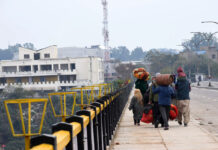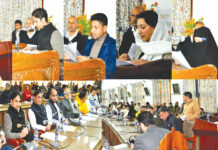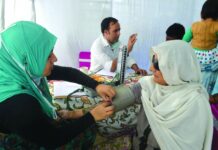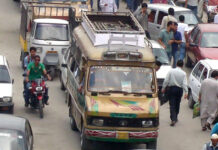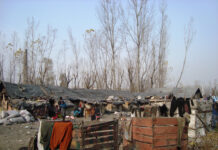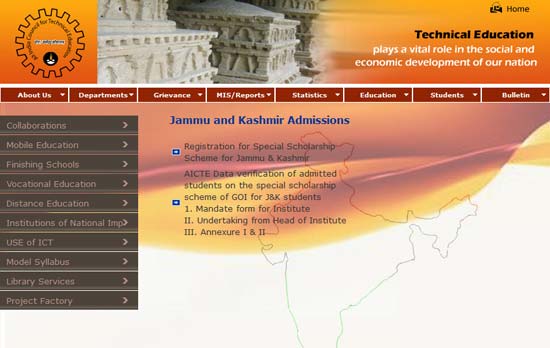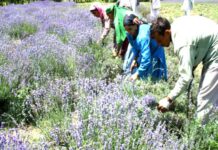Tobacco use has grown in the valley over the years leading to an increase in related diseases. Shazia Yousuf meets some tobacco dealers in Srinagar who tell her they would switch over to other businesses if they could.
Half hidden behind the huge mound of tobacco, 60-year-old Ghulam Mohammad Bhat is catering to the needs of his desperate customers that form a big queue outside his shop in Batamalo Bus Stand. Bhat sells two quintals of tobacco a day. The shop smells of heaviness with everything looking sticky. All one can see is the exchange of tobacco packets with money which he does speedily.
Bhat has been selling tobacco since 1972, when he was 11 and joined his ancestral business. Bhat looks misfit for his job; he has never smoked and wants government to ban the tobacco products in valley.
Bhat talks endlessly; what his two sons who deal with medicines tell him about the diseases tobacco products cause; how political instability has increased his customers since last three years; and how it pains him to see teenage girls from rural areas buying themselves tobacco from his shop.
 He sees a ray of hope. At the time when government has been unable to implement ban on tobacco products a person like him is ready to play his part. He says he will be the happiest person if the government bans tobacco in the region. All he wants is the rehabilitation of the families whose livelihood depends on this trade, “I have two sons, both of them earning, but there are families who rely on this trade for their bread and butter, they should be rehabilitated by the government,” he says. “Otherwise the ban will never show positive results, a person will prefer doing it illegally than seeing his children dying of hunger,” warns Bhat.
He sees a ray of hope. At the time when government has been unable to implement ban on tobacco products a person like him is ready to play his part. He says he will be the happiest person if the government bans tobacco in the region. All he wants is the rehabilitation of the families whose livelihood depends on this trade, “I have two sons, both of them earning, but there are families who rely on this trade for their bread and butter, they should be rehabilitated by the government,” he says. “Otherwise the ban will never show positive results, a person will prefer doing it illegally than seeing his children dying of hunger,” warns Bhat.
Ghulam Nabi Chitgar makes a good example. The 75-year-old of old city Naidkadal has been selling tobacco since he got married at the age of 30. He ran his family, married off his five daughters and performed Hajj twice. Whatever little he earns from selling tobacco at his shop in Naidkadal old city is what caters to the needs of Chitgar, his wife and their old age, “I am ready to leave but cannot think of an alternative job at this age. Government will have to rehabilitate people like me,” Chitgar says while passing a tobacco pouch to a customer.
Subscribing to views of Bhat is Abdul Hameed Wani who sells tobacco in the adjacent shop. Wani has family of eight to support, including his four children and aged parents, “We have been doing this business from four generations, but I have decided to stop it here, if the government comes up with a proper rehabilitation plan I will be the first one to pull down the shutters of my shop,” Wani says.
To the annoyance of his customer Ghulam Mohammad Rather who has come from Parihaspora to buy his monthly stock, Wani talks about the ban on the import of the tobacco from other states, “I swear I will grow it in the courtyard of my house if government bans it. I have been smoking tobacco for last 45 years, almost half a kg a day, it doesn’t harm rather reduces anxiety. May be the cigarettes harm but the water in the hookah absorbs all the toxic substances from tobacco, leaving the smoke pure and safe,” Rather says leaving everyone with a perplexed smile and Wani with a 500 rupee note.
Wani says that the government should not only ban tobacco selling but its import from other states. He says it will lead to smuggling. Wani, however is apprehensive. He doubts the claims government has been making from time to time, “I remember how my grandfather would pay tax to the government, I think they will not do, they still generate lot of money from the taxes,” he says. “They don’t think of the educated youth who due to unemployment join this trade, it is ruining the society.”
26-year-old Aadil Ahmad, a science graduate whose family runs a tobacco shop at Parimpora thinks the same. He says it pains him to sell something to people that he knows can kill them, “We have been doing this trade over three generations, it was my duty to bring changes for good, but when survival becomes priority, you forget all your responsibilities towards society,” sighs Aadil. “Employment alternatives for youth by the government could have certainly brought some hope,” adds Aadil.
Surprisingly, all of them, Bhat, Wani and Aadil are non-smokers eagerly waiting for the government to come up with a rehabilitation and awareness plan, “I broke the only hookah that we had at our house, person like me can only take small steps, government has to make big changes,” Hameed concludes and returns to the mound of tobacco in front of him.


